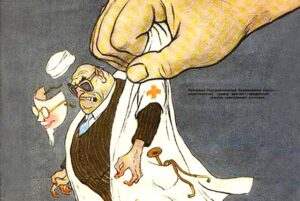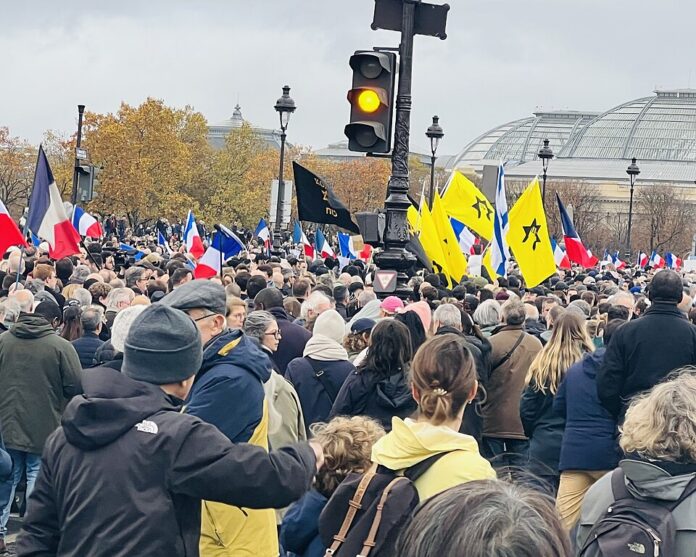The Hamas attack against Israeli civilians in early October, which resulted in the slaughter of 1400 people, has a particular impact on the European left parties. These parties supported Palestinian nationalism and the demand of the Palestinians for their own country traditionally. However, this time, the situation is more complex. The military intervention of Israel into the Gaza Strip is the result of a terrorist and racist attack committed by Hamas against civilians who were Jews.
Many parties of the European Left and far-left usually condemn the cruel behaviour of the Israeli army and the repression of Israeli authorities against Palestinian militants. In many aspects, this is an easy task. Nevertheless, this time, the situation is entirely different. Qualifying Hamas’ actions represents a significant challenge for many of them.
However, the question is: Did the Left realise this fundamental difference?
Some parties still do not want to see that Hamas does not represent the Palestinians.
Does a Left Antisemitism exist?
The term Antisemitism is a form of racism that targets the Jewish population and whose most extreme consequence was the Holocaust during World War II. Antisemitism characterised and characterises the Far Right.
Nevertheless, today, antisemitic rhetoric exists in several parties of the Left – first of all, the Labour Party in the UK -the anti-globalisation movement as well as in the extreme Left of the Marxist-Leninist or Trotskyist kind.
The main features of this “left antisemitism” are the reference to the supposed Jewish lobby that moves the strings of the world economy, the arbitrary interpretation of Zionism as a racist religio-political ideology, the support of the position of the dissolution of the state of Israel and the demand that Jews of the Left to constantly condemn “Israel’s behaviour against the Palestinians”.
Today, several left parties participate in the parliaments of the EU member states: the German Die Linke, the French La France Insoumise, the Spanish Podemos, and the Greek SYRIZA, among others. The British Labour Party is the second biggest party in the UK and still has considerable ideological influence even in Europe.
Die Linke condemns the Hamas terrorist attack.
The executive committee of the Die Linke issued a resolution on October 11, strongly condemning Hamas’ horrific terrorist attacks on Israel, which killed over 1,200 people.
“The numerous murders, the massive rocket fire, and the reports of kidnappings are shocking. The brutal massacre of 260 participants at a music festival is an act of cruelty. More than 100 victims have been recovered from a kibbutz. More bodies are still being found. Our thoughts are with the victims and their families, and we sincerely hope that those abducted will soon be released”.
The resolution recognises that “Hamas’ declared goal is the destruction of Israel and the establishment of an Islamist dictatorship in Palestine”.
The Die Linke stresses that from the history of the Holocaust and antisemitism, the State of Israel is a historical necessity that is never up for debate.
“We will continue to confront any antisemitism here, in the country of the perpetrators. That remains our responsibility, especially in these times”.
In addition, the resolution underlines that “with its attacks on Israel, Hamas has also put the Palestinian population in great danger. We are concerned that the Israeli government’s response will once again kill, and has already killed, numerous civilians. Most people in the Gaza Strip cannot flee. There is a threat of a massive wave of military violence and attacks, from which the civilian population will primarily suffer. This also affects the Palestinians in the West Bank and Palestinian citizens of Israel. It is in Hamas’ interest that this spiral of violence continues to spiral”.
La France Insoumise and Podemos
The hardline party of Jean-Luc Mélenchon, France Unbowed, refused to qualify Hamas’ attack as a terrorist act and characterised it as an “armed offensive”. According to the party, only the militants of Hamas committed “war crimes” but not their organisation. A difficult to understand argument.
Although after Israel’s military response against Hamas in the Gaza Strip, in France occurred, an explosion of antisemitic acts, Mélenchon suggests that “the German and neoliberal Europe kneels before” the Jewish communities.
As a result, the fragile left alliance between his party, the Socialist Party, the Greens, and the Communists, was dissolved. Recent polls indicate that Mélenchon’s party suffers from considerable decline.
Also, Podemos, a governing partner in Spain, doesn’t condemn Hamas and its acts as terrorists. Ione Belarra, Minister of Social Rights and Podemos activist, said that Gaza is suffering from a “planned genocide”. He called on the Spanish government to denounce Israeli Prime Minister Benjamin Netanyahu for “war crimes” before the International Criminal Court.
Podemos’ anrtisemitism is not new. It promoted political decisions, at a national and local level, that restricted trade agreements with Israel since 2015. In 2020, the mayors of a total of 58 municipalities in Spain declared their towns and cities “Spaces Free from Israeli Apartheid”. Municipal plenary sessions approved that local governments would not contract with any Israeli company or company with relations with Israel. As a result, local leftist groups discriminated against Israeli theater companies, lecturers, filmmakers, and actors.
The Labour Party was severely affected by antisemitism.
After Jeremy Corbyn was elected as leader of the party in September 2015, there were growing allegations of antisemitism in the party, which prompted several MPs to resign. Outrage about Corbyn goes back to past statements in which he had called Hamas “friends”, which he later rescinded and said he regretted.
Corbyn’s successor, Keir Starmer, condemned the Hamas attacks on Israel on October 7, called for the immediate release of all hostages, and reaffirmed Israel’s right to defend its citizens from terrorism. However, increasing concerns exist that the issue could make divisions within the party explode.

[Pro-Palestinian march in London, 11 November, 2023. Credit: Wikimedia Commons/CC BY 2.0 Author: Julian Stallabrass from London, UK]
A Stalinist legacy?
Has this position of the Left been the same since the founding of Israel? The answer is no! Unlike Stalinism, the Left had a firm position of condemnation of the slightest hint of antisemitism. Moreover, many Left parties supported the young state of Israel both in its early stages and during the Arab-Israeli War of 1967.
Many of the Russian revolutionaries, Bolsheviks, Mensheviks, social revolutionaries, and anarchists were of Jewish origin, without being followers of Zionism or religion. This fact had made Revolutionary Russia the target of extreme anti-Semitic attacks. In the early years of the Soviet Union, the number of Jewish officials in the state administration and the party was high. However, with the rise of Stalinism was dramatically reduced, and by the 1930s, only a tiny percentage of Jews still held positions in the state administration.
For his part, Stalin treated the Jewish community according to his interests, which led to anti-Semitic policies. More specifically, after the Ribbentrop-Molotov Pact of 1939, the regime purged the Soviet Foreign Ministry of its officials of Jewish origin. Large sections of Jewish populations were forcibly transferred to the “Jewish autonomous region” of the Far East – as part of a broader policy of “ethnic displacement” that affected Tatars, Germans, and Greeks.
After the war and despite Stalin’s pro-Zionist foreign policy, the Soviet Union became the scene of successive anti-Semitic events. Between 1948 and 1953, dozens of intellectuals, scientists, and even members of the government of Jewish origin were expelled, tortured, or executed, mainly on the night of August 12, 1952, and the “conspiracy of doctors” in 1953.

[Cartoon published in the Soviet Krokodil magazine during the “conspiracy of doctors” anti-Semitic campaign, January 1953. Credit: Wikimedia Commons/CC BY-SA 4.0]
However, the Soviet Union had a different approach in the Middle East. There, he estimated that the fledgling Jewish state, most of whose leaders were social democrats, could become a Soviet-influenced state in the Middle East as imperialist powers controlled the Arab populations. Thus, thanks to the support of the Soviet Union – the Labour government of Great Britain opposed this – the UN received in November 1947 the decisive resolution for the establishment of Israel. The USSR was also the second country in the world to recognise Israel while reinforcing it with armaments during the 1948 Arab-Israeli war.
However, the Soviet Union soon changed its approach. Although the first 12 governments, from 1949 to 1966, were formed by the left-wing Zionist Mapai, Israel was not interested in becoming a satellite of the Soviet Union and was reaching out to the West. In addition, in 1953, the military revolution broke out in Egypt, paving the ground for the Soviet penetration in the region. Thus, the USSR’s pro-Israel policy suddenly gave way to pro-Arabism.
Since then, the condemnation of Israel as an agent of American imperialism has been part of the political rhetoric of the communist parties. Curiously, even the far left was pro-Jewish, with the most extreme case being the support of a prominent English Trotskyist, Tony Cliff, to Israel during the Six Day War.
But, eventually, the Soviet point of view successfully infiltrated the far left, which, over the years, assimilated Stalinist antisemitism.
How the Left expresses its antisemitism
But let’s look at the current characteristics of “left” antisemitism.
First, there is the stereotype of the “powerful Jewish lobby,” which has its deep roots in 19th-century far-right thought. This view neglects that European Jewish populations consisted of farmers, industrial workers, civil servants, and intellectuals.
Second, is the characterisation of Zionism as a racist ideology. However, Zionism was nothing more than the expression of Jewish nationalism in a period of rising nationalism in Europe in the 19th century and aimed at creating a separate state. There were Left, right, and even fundamentalist versions of Zionism, as happened with the rest of the nationalist movements in Europe. During the Russian Revolution, the Marxist Zionist organisation Poale Zion armed a Red Army brigade.
Third. The position of many left-wing intellectuals and politicians, as well as the vast majority of the far left in favour of the dissolution of the state of Israel, is the most blatant expression of today’s left-wing antisemitism. A careful study of the historical events of that time shows that there was no violent expulsion of Arabs – which, if it did exist, was supported by the Soviet Union as well as the communist parties. However, movements of populations, more or less violent, occurred in Eastern European countries (People’s Democracies), leading to the displacement of about 13 million Germans. But the Left never called for the dissolution of the responsible states. As it does not in the many cases of ethnic cleansing occurring on the planet after World War II. Isn’t this insistence only on the State of Israel an expression of antisemitism?
On the other hand, Israel remains the only parliamentary democracy in the Middle East. Despite the dominance of the hard right in the political scene, both leftist parties (including the Communist and a Trotskyist one) operate legally. Leftists, Arab anti-Zionists, and communists are members of the Israeli parliament. Does the same happen in neighboring countries? Finally, even demanding that left-wing Jews constantly condemn Israel’s attitude against the Palestinian activists is a policy of discrimination against them and fundamentally an act of antisemitism.

